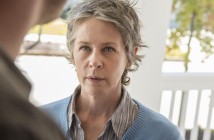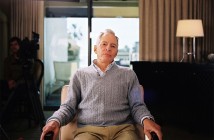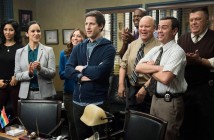Doctor Who, Series 8, Episode 13, “Last Christmas”
December 25, 2014, 8:00 p.m. (EST), BBC
God, I love Doctor Who. Most Christmas episodes tend to try to do one thing very well, whether it’s instill a moral, or remind us of some hidden truths we obscure too often, or just give us a sense of magic during a dark season. Yet “Last Christmas,” like many of the best Doctor Who episodes, has about a million different things on its mind at any given second, from dream crabs to Santa Claus, from a layered narrative structure to a complex character interaction that may just be made better for its final narrative fake out. It even stops for a moment to imply that, really, The Doctor could very easily be Santa Claus (after all, how better to explain delivering presents around the whole world in one night than being a time traveler whose transport is infinitely bigger on the inside and can drop you right inside anyone’s house?). It’s a marvelous Christmas special, for the way it keeps insisting on magic and faith as central to the story, but also takes time to be a good, scary coda to the season that’s come before. I can’t say I like it better than “A Christmas Carol,” but it feels more like what Doctor Who should be than any prior Moffat Christmas special (with the possible exception of “The Time of the Doctor”): a wildly ambitious confluence of tones and ideas that sometimes bothers to cohere into something resembling a narrative, and sometimes dashes off in a direction because hey, doesn’t that look like fun?
Over the course of series eight, Steven Moffat seems to have been working out how to use his biggest tropes against us as viewers. He began the season by calling Clara a control freak in a way that felt like Moffat’s worst writing of female characters, only to develop her into perhaps the most complex and nuanced character he’s ever created. In “Listen,” he pitched us a vintage Moffat premise—monsters that are perfect hiders, always listening and going unobserved—then veered off to tell a very different story about The Doctor’s fear and how it drives him. And here, the dream crabs initially seem to be another slight twist on Moffat’s central monster generator—they come when you think about them and weaponize your dreams against you—and then continues to play with our story expectations. “Last Christmas” is a base under siege story, which is about the most textbook Doctor Who story there is, except that there isn’t any base, and the siege is happening on levels that remain unseen until the episode’s final moments.
Moffat wisely plays our expectations against us, hand-waiving away important bits of exposition because we’ve seen this before, and we’ve seen this Doctor ignore the set up. So we barely notice that this base has no particular purpose, nor that Shona’s desperate journey through the infirmary is leading nowhere, nor that The Doctor and Clara just arrive there for no reason from Clara’s roof. Of course they do, we think. That’s what they always do. They show up in the middle of danger and then work to stop it. Because Doctor Who so often works on levels approximating dream logic, we barely notice that “Last Christmas” is playing logistically like a dream from its first moments. On this show, anything can happen, so when anything does, we’re likely to nod and go along with it. Moffat knows that we know how to watch Doctor Who, and increasingly he’s using that viewer-strength to surprise us.
Another one of my favorite things about this episode (and writing about it is making me realize I already have many) is what about it is scary. In its traditional horror mode, Doctor Who is nightmare fodder, but here, the real fear is waking up. This doesn’t, strictly speaking, make narrative sense—after all, waking up means the characters are not killed by the dream crabs—yet again and again, it’s returning to real life that is played as the moment of trepidation, the moment of fear, the moment of impending disappointment. Clara doesn’t want to leave Danny. Shona doesn’t want to leave the sleigh. No one wants the magic spell to wear off. No one wants the story to end. So, then, “Last Christmas” isn’t just a story about being afraid of waking up from a nightmare to a world that is somehow less magical and more disappointing than the one you dreamed of. It’s also a functional season finale about not wanting Doctor Who to end for a while. We’re all clinging to that sleigh for just a few more minutes. We’re all sleeping in, even though we know it could hurt us to do so. We’re all hoping for, in the parlance of the child not ready to wake, hoping for just five more minutes. That is the narrative tension undergirding this episode. That is the subtle fear that builds throughout it, rendered metatextual within the way that we watch it. That is what makes this a brilliant episode of television, and what makes “Last Christmas” a perfect title for it.
Santa almost comes off as inconsequential in all of this, at first blush, a fun Nick Frost performance that is largely a collection of clever Santa jokes and logical inversions. Yet he comes to mean a lot more when we think about the episode from the perspective of dreams fulfilling some innate need in us, and of their ending (and thus their loss) as something sad and unfortunate. Santa Claus serves several purposes in the life of kids, from allowing them to believe in magic to instilling a sense that their actions in the world bear out moral consequences, yet in the end, he is a dream from which (most of us) awaken. Santa asks us, again and again throughout the episode, to have faith in him, to believe just a little bit longer. Each and every time he does, Santa is part of a dream (albeit, a dream that has telepathically connected a lot of real people), and though the episode ends on a shot of a tangerine that implies otherwise, it is possible to read this episode as a story about how we all lose our belief in Santa, but how that belief served, and maybe serves, an important purpose in our lives.
At first, that scene with an aged Clara trying to celebrate a last Christmas with The Doctor felt like a perfect send-off for the character, one that allowed her to return for a goodbye, gave her a full and fulfilling life, but didn’t detract from the pain and complexity of the way she and The Doctor parted at the end of “Death in Heaven.” It made those actions have consequences. It made this story have weight. It felt right for this to be the two’s last Christmas together, shared decades later, when Clara has had time to learn and heal. And yet, I think perhaps the actual ending works in terms of the story the show is telling here, and the purpose it is supposed to serve. Clara waking up old and saying goodbye to The Doctor felt like Shona waking up to a drab and messy apartment, a disappointing return to the real world where everything is just a little less magical. But Doctor Who is magical. Doctor Who is a dream, from which we all hope not to wake. This is an episode that begs you not to return to your more mundane life, and ends with The Doctor and Clara racing off on another adventure. This could have been their last Christmas (and, since Coleman could leave before the next Christmas special, it still might be). This could be any of our last Christmases, or our last Christmas with any number of our relative. But this can’t be Doctor Who’s last Christmas. Doctor Who is a dream that never ends. It’s a dream that begs you to stay, even as you are called back to waking life. It’s a dream that asks you to leave your troubles behind and just take the reigns of Santa’s sleigh for a while. Merry Christmas to all, and to all a good night. Sleep well. We’ll dream again together next year.
The Roundup
- “You know no one really likes the tangerines, don’t you?”
- “Hello girl. Sorry about all this. We are just three ordinary…roof people, doing some emergency…roof things.”
- “You know how you grew the beard as a bit of a disguise? People have picked up on it.”
- “You know what the big problem is, between telling fantasy and reality apart?” “What?” “That both are ridiculous.”
- “Is it possible that I’m about to work with someone who might be a dream?” “If it helps, so am I.”
- “Reindeer can’t fly. They just can’t.” “No, they can’t. It’s a scientific impossibility. That is why I feed mine magic carrots.”
- “That was always the legend. You think about a dream crab, a dream crab is coming for you.”
- “They’re a bit like facehuggers, aren’t they?” “Face huggers?” “You know, from the horror movie, Alien.” “There’s a horror movie called Alien? That’s really offensive. No wonder everybody keeps invading you.”
- “How do you make you being clever into me being clever?” “I always protect your ego from the truth.”
- “I didn’t die saving the world, Doctor. I died saving Clara. The rest of you just got lucky.”
- “Do you know why people get together at Christmas? Because every time they do, it might be the last time. Every Christmas is last Christmas. And this is ours.”
- “So these creatures…when the feeding goes wrong, they die?” “Carnivore’s hazard. Food has teeth too.”
- “You’re a dream who’s trying to save us?” “Shona, sweetheart, I’m Santa Claus. I think you just defined me.”
- “The TARDIS. Now. Everyone. Come on!” “Doctor, that’s not the real TARDIS!” “Well, let’s hope I dreamed it really well, then.”
- “I’ve always believed in Santa. He just looks a little different to me.”
- Well, it looks like the series nine premiere will be called “The Magician’s Apprentice” (loved the James Bond-iness of that title card, by the way). Pretty much can’t wait for that. See you all back here when the show returns next year.
"Last Christmas,” like many of the best Doctor Who episodes, has about a million different things on its mind at any given second.
-
GREAT




